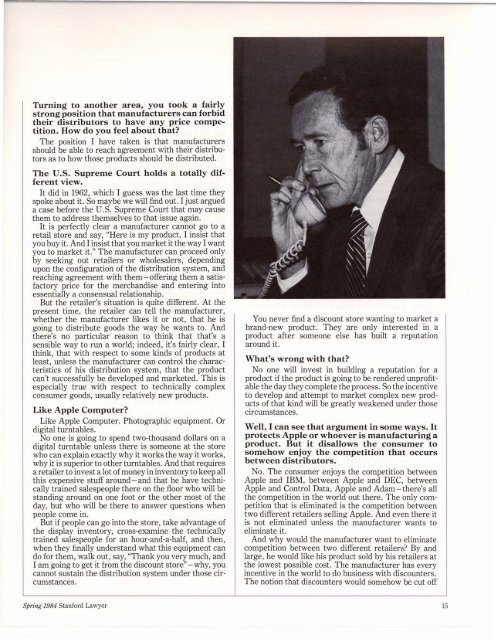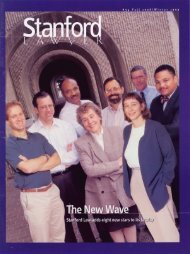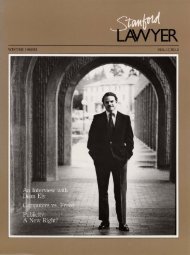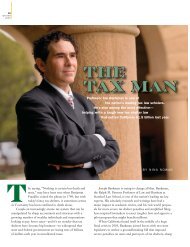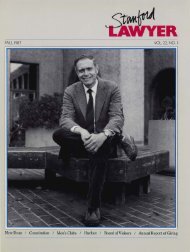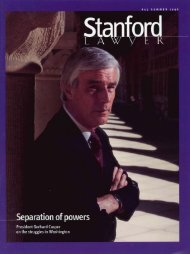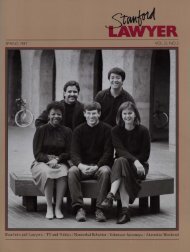This is typical political behavior by politicians whohave a time frame that never extends beyond the nextelection. They solve the problem by keeping today'srates low and letting someone else worry about the factthat you are pushing forward in time this enormousbulging rate base. And because the telephone companyhas to be allowed to earn a reasonable rate of return onthis ever-fattening rate base, eventually it has to beamortized.The FCC, under the new leadership, has recognizedthis and has required depreciation rates be made somewhatmore reasonable. And the consequence of that isthat we are going to have to be eating our way into thismountain of unamortized costs that the state regulatorshave pushed out in front of us. And that, too, will makerates tend to rise, although, again, it has nothing to dowith the divestiture.So, in short, I would say something along the followinglines. The costs, as opposed to rates-the costs oftelephone service will fall, and continue to fall in theyears ahead.The divestiture, by greatly intensifying competitionin long-distance services and a number of other services,will tend to cause costs to fall more rapidly thanthey would have fallen otherwise. Certainly the cost 'Ofcustomer premises equipment will fall very dramaticallywith competition. We have every reason to expectthat switching equipment and other kinds of equipmentwill fall similarly.Rates, as opposed to costs, are affected by accountingconventions, involving such things as cross-subsidiesand depreciation. And for some of these accountingreasons, what has been kept artificially low before islikely to move back to a more economically realisticlevel.The primary thing that has been kept artificially lowbefore are local residential rates. So local residentialrates will be subject to two influences: they will besubject to the influence of falling real costs, but theyalso will be subject to the influence of more realisticrate-making. Which of those will dominate is notentirely obvious, although I think that even on aninflation-corrected basis, local rates will probably risefor a few years while we go through these correctiveprocesses, and then, after four, five or six years, theywill probably begin falling in real terms as the cost decreasesbecome the dominant factor.How much will that increase the rates? They are notgoing to double or quadruple or any of the silly thingsthat have been said. They might increase as little as 25or 30 percent. They might increase as much as 50 or 60percent. Those are the realistic numbers.You have said the AT&T divestiture favorsconsumers, but in a sense it's the business consumer,not the residential consumer that isfavored.No. It doesn't do people any good to have their businessespay their phone bills for them. The phonesystem works less efficiently because of these crazypricing features being forced into it. And you pay yourreal phone bill every time you buy a loaf of bread or ablouse at the store. It simply forces up the costs of thebusinesses that sell you the things that you buy.I have mixed reactions as a consumer. We hada .system that in some ways was working verynIcely. I could call almost any place in thecountry, or even the world, in seconds. Mytelephone usually works, the service is good.'Ye have taken something that is very operatIveand reasonably cheap and chaQged it. Andfor the next four to five years there is thatunknown out there.That's right. Every change can be greeted with apprehension.Will it ultimately be better for me-the residentialcustomer?Oh, sure. On average, I haven't the slightest doubtabout it.Everyone's phone costs are going to fall. And, onaverage, rates will follow costs. The problem is buriedin the "on average" statement, because some peoplewill benefit more than others. And because of theseaccounting distortions that we have had in the past,there will have to be, or there will undoubtedly be, acorrection period.On the other hand, we can go right on making thesemistakes if we are determined to do so. Divestituredoesn't make it impossible. Indeed, when I designedthe divestiture decree, I carefully built into the decree amechanism that permitted the regulators to go onmaking all the old mistakes, if they wanted to make theold mistakes. They have to make them somewhat moreout in the open now, but the means for perpetuatingthose mistakes were carefully built into the consentdecree.What has happened is that the regulators have takenadvantage of the fact of the consent decree, a bigpolitical maneuver. They have thrown up their handsand said, this strange, mystical force way off inWashington, D.C., over which we have no control, isgoing to make us correct these mistakes. So they aresort of using it as a screen, a political excuse, behindwhich to hide while they change some of these things.Now, that doesn't particularly bother me. I am delightedto see them changing these things around,because there were economic errors, and it would bebetter offif they changed. I don't much care if they arepointing to the divestiture as the cause of these things.But no one with the slightest comprehension of whatthe system is about should be deceived.14<strong>Stanford</strong> <strong>Lawyer</strong> <strong>Spring</strong> <strong>1984</strong>
Turning to another area, you took a fairlystrong position that manufacturers can forbidtheir distributors to have any price competition.How do you feel about that?The position I have taken is that manufacturersshould be able to reach agreement with their distributorsas to how those products should be distributed.The U.S. Supreme Court holds a totally differentview.It did in 1962, which I guess was the last time theyspoke about it .. So maybe we will find out. I just argueda case before the U.S. Supreme Court that may causethem to address themselves to that issue again.It is perfectly clear a manufacturer cannot go to aretail store and say, "Here is my product, I insist thatyou buy it. And I insist that you market it the way I wantyou to market it." The manufacturer can proceed onlyby seeking out retailers or wholesalers, dependingupon the configuration of the distribution system, andreaching agreement with them- offering them a satisfactoryprice for the merchandise and entering intoessentially a consensual relationship.But the retailer's situation is quite different. At thepresent time, the retailer can tell the manufacturer,whether the manufacturer likes it or not, that he isgoing to distribute goods the way he wants to. Andthere's no particular reason to think that that's asensible way to run a world; indeed, it's fairly clear, Ithink, that with respect to some kinds of products atleast, unless the manufacturer can control the characteristicsof his distribution system, that the productcan't successfully be developed and marketed. This isespecially true with respect to technically complexconsumer goods, usually relatively new products.Like Apple Computer?Like Apple Computer. Photographic equipment. Ordigital turntables.No one is going to spend two-thousand dollars on adigital turntable unless there is someone at the storewho can explain exactly why it works the way it works,why it is superior to other turntables. And that requiresa retailer to invest a lot of money in inventory to keep allthis expensive stuff around - and that he have technicallytrained salespeople there on the floor who will bestanding around on one foot or the other most of theday, but who will be there to answer questions whenpeople come in.But if people can go into the store, take advantage ofthe display inventory, cross-examine the technicallytrained salespeople for an hour-and-a-half, and then,when they finally understand what this equipment cando for them, walk out, say, "Thank you very much, andI am going to get it from the discount store" -why, youcannot sustain the distribution system under those circumstances.You never find a discount store wanting to market abrand-new product. They are only interested in aproduct after someone else has built a reputationaround it.What's wrong with that?No one will invest in building a reputation for aproduct if the product is going to be rendered unprofitablethe day they complete the process. So the incentiveto develop and attempt to market complex new productsof that kind will be greatly weakened under thosecircumstances.Well, I can see that argument in some ways. Itprotects Apple or whoever is manufacturing aproduct. But it disallows the consumer tosomehow enjoy the competition that occursbetween distributors.No. The consumer enjoys the competition betweenApple and IBM, between Apple and DEC, betweenApple and Control Data, Apple and Adam-there's allthe competition in the world out there. The only competitionthat is eliminated is the competition betweentwo different retailers selling Apple. And even there itis not eliminated unless the manufacturer wants toeliminate it.And why would the manufacturer want to eliminatecompetition between two different retailers? By andlarge, he would like his product sold by his retailers atthe lowest possible cost. The manufacturer has everyincentive in the world to do business with discounters.The notion that discounters would somehow be cut off<strong>Spring</strong> <strong>1984</strong> <strong>Stanford</strong> <strong>Lawyer</strong>15


